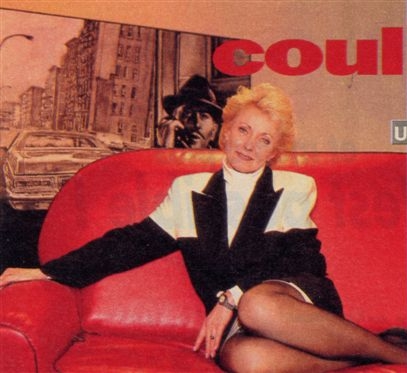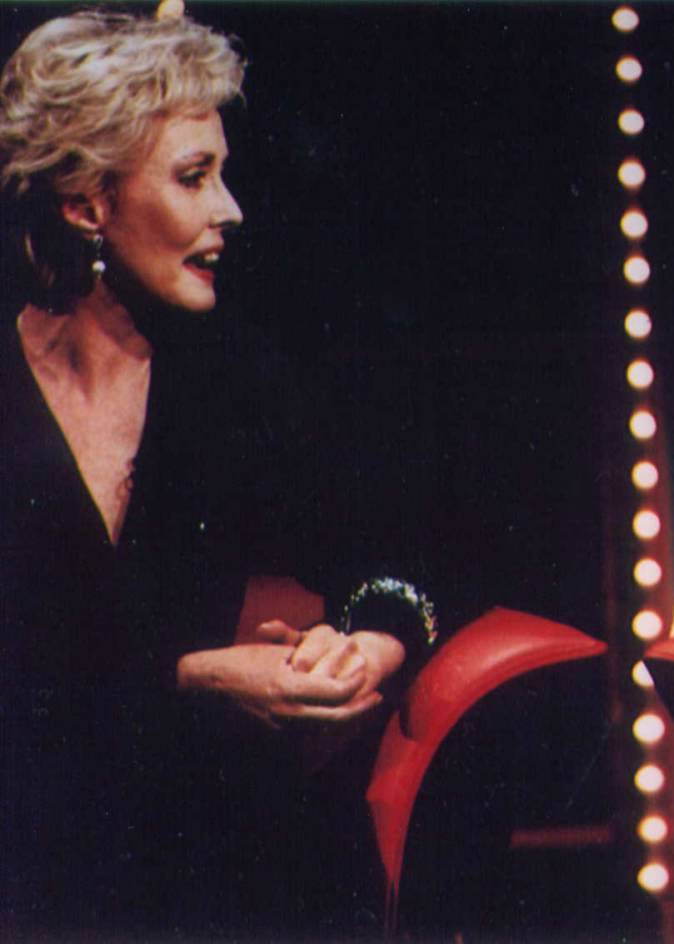By Alain Carrazé and Romain Nigita, Series' Anatomy : le 8e Art Décrypté, 2017
|
|
Home | Cette page en Français |
| Judith McConnell, actress | |||||
|
By Alain Carrazé and Romain Nigita, Series' Anatomy : le 8e Art Décrypté, 2017 |
|
||||
 To
know exactly how a daytime soap is shot, it's better to ask the concerned ones:
the actors ! In
1994, the shooting of Santa
Barbara has just ended in the United States and Judith McConnell is in
Paris to promote the last episodes of the big success of TF1. Alain Carrazé
interviews her with Jean-Pierre Dionnet for the show Destination : Séries.
To
know exactly how a daytime soap is shot, it's better to ask the concerned ones:
the actors ! In
1994, the shooting of Santa
Barbara has just ended in the United States and Judith McConnell is in
Paris to promote the last episodes of the big success of TF1. Alain Carrazé
interviews her with Jean-Pierre Dionnet for the show Destination : Séries.
Apparently
very relaxed (maybe thanks to the French champagne which she sips during
the interview), the one who played Sophia Capwell during eight hundred and
ninety-one episodes (between 1984 and 1993) enthusiastically explains the
typical timetable of the soap-opera actors, a routine which she knows like the
back of her hand to have also played in several episodes of Another
World and As
the World Turns.
McConnell is all the more relevant to point out the specifics of the shooting of
a daytime soap that she also played as a guest-star in many more traditional
shows, from Mannix
to Dragnet,
including The Wild Wild West, The
Green Acres, Get
Smart, Cannon, The
Streets of San Francisco and even Star
Trek (yes, also !). And do not believe that Santa Barbara marked the
end of her career. We shall find her in episodes of JAG, Beverly Hills 90210, Sliders,
Criminal
Minds, Cougar Town and American
Crime Story : The People vs OJ Simpson !
What is the difference between the shooting of a show such as Mannix and of a soap-opera like Santa Barbara ?
The biggest difference is time. An episode of Mannix is shot in seven to eight days. Sometimes more. But the script is probably of the same size, even a little shorter, than an episode of Santa Barbara. While we shoot an episode of Santa Barbara in one day ! A single day from the beginning to the end. On Mannix, in seven days, the actors of course have more time to repeat. We have time to shoot scenes outside, to make overall shots. In this kind of show, we shall see a shot with a limousine which goes to a hotel, then a shot of the doorman who helps the actor get out of the limousine, then a shot of the actor who goes into the hotel, then a shot of the inside of the hotel. We shall have seen all of this even before the actor said: "Hello". In Santa Barbara and the other soap-operas, we speak constantly ! (laughs) We do not have time for elaborate shots. It takes too much time. The story passes by the actors and the lines. The production is limited. It is the actors who do all the work.
You thus think that, for an actor, it is more difficult to work on a soap-opera than on a dramatic series where we have time to repeat ?
Yes, it is a bigger challenge to work on a soap opera. It is more difficult to shoot an episode of one hour in one day rather than in seven or eight days with repetitions. Or harder than a movie, with six months to obtain one hour and a half. It is even harder than theatre. At the theatre, if everything goes well, we have four weeks of repetitions. But it is funnier to work on a soap-opera. It is almost as you go on stage because in one day, we play the beginning, the middle and the end. We play the whole play, all together, and almost always in order. The most difficult thing is to learn the technical aspects. Once you are not afraid of that anymore, it becomes very exciting ! (laughs) It is almost like a live broadcast. We jump down from a cliff. "Oh ! Here we go !" And that begins again the next day.
How does a typical day on a soap-opera take place ?
It
depends on the shows of course. On Santa
Barbara, for several years we had to arrive at 7 a.m., and we worked
very late, until 10 or 11 p.m.. Sometimes 2 a.m.. In any case, you should not
hope to leave before at least 8 or 9 p.m.. It is huge. But then they tried to
shoot faster. We were forced to end the episodes in less time. Our days began at
8 a.m. and ended by 6 or 7 p.m.. Unfortunately we saw it on screen because the
result was not as good. Thus a normal day lasts twelve hours. In the morning, I
wake up and I jump out of bed ! I brush my teeth, I have a shower and then I put
jeans on. I leave my home in sweat-shirt, with wet hair and without make-up.
When they arrive at work, actors are horrible to see ! We read our script with a
single open eye. We begin with the first repetition, with the actors and the
director. We have the script in hand, to which we can make changes. We do what
we call the "blocking" : "Hold this line there, go to this line
there, kiss him at this moment, do not kiss him at this moment, slap him after
this line..." Then we go on the set and we repeat the same procedure for
cameras, with the script in hand. Like that, the cameramen, the sound recordists
and the property men know what we shall do. During these various repetitions, we
are not all present simultaneously. We repeat scene by scene. Thus the actor who
is not in this scene is trying to be made beautiful ! (laughs) We begin to get
our hair done and made up, step
by step. Then we go to the wardrobe for the fittings.
But when we are called back, we run on the set, with the pins in the clothes and
curlers in our hair. The actresses have curlers on their heads all day long. And
we try to play love scenes with that in the vision field. The whole day is spent
trying to get dressed and putting on make up. The third repetition is the dress
rehearsal: you must be ready and you have to know your script. You have no more
script in your hand. Then we go to the recording of the episode. The idea is to
shoot the episode from the beginning to the end without stopping. But there are
always stops. There's nothing we can do about it. But as actors and as
technicians, our work is to be perfect from the first take. And we try, you
know. But if you make permanent mistakes, you do not keep your job for a very
long time.
 With
such a rhythm, do some actors take advantage of it to try to steal the first
place ?
With
such a rhythm, do some actors take advantage of it to try to steal the first
place ?
Not very often. Only the bad actors ! When I say "bad", it is not that they are not kind. They are not just talented. It is when the actors play together that we obtain the best scenes. That's what attracts and holds most of the public. It is this communication, this exchange when there is something in the actors' mind. Most of them know it. And if they are talented actors, they will make it automatically. And we work with four cameras at the same time. We can steal the first place only if the camera is aimed at you. You can do handstands, if the camera is not on you, it will be of no use. I would not give names, but I know some actors who try to draw the attention of the camera. But the director stays up behind the monitors. These actors can always try to make mimes to attract the camera, but there are not very many (laughs). I did it only two or three times.
Do you always respect the script or can you improvise ?
No, we do not have the right to improvise. Absolutely not, because all the technical aspects are determined by the script and what we say. When we begin to shoot, everything is finalized already. We can change the timing of a verb but that's all... The director must know at which moment he has to change the camera. The pole vaulters must know at which moment they move the microphones. It is choreography based on what comes out of our mouths. It is very specific. But we can change the text in the morning, during the first repetition. We cannot change the story, but we can modify a word if we think that it is not something that our character would say. It sometimes raises quarrels. We are told: "You have to say it like that !" And we answer: "Never !" But once it is settled, we do not touch it anymore.
Do you always have time to learn your lines ?
If we do not know our lines, we do not have a job anymore ! If you want to keep your work, you have to learn it. (laughs) That's it ! Whatever the method.
When you play in a show for years, are you sometimes fed up with it ? When you get up in the morning, do you sometimes say to yourself : "Oh Good God, again ?"
Oh yes ! But then I think of my loans for my car ! (laughs) And I say to myself that I am lucky to be a busy actress. There are so many actors who have no work. It is a great job. When we arrive at the recording studio, it is there that it becomes a real pleasure. To learn your lines, to be made up, that's the boring side. What is exciting, is the communication between actors, the creation. Sometimes, at the end of a scene I say to myself: "I have just created an emotion, I created all pieces of a human being who did not exist." What an enjoyment ! That is the aim. Then we go back home, we remove the make-up and the following morning we say to ourselves: "Oh no, again ?"
Do the fans, in particular the televiewers' mail, have an influence on the development of the characters ?
The
public has a certain influence on the show. The opinion of the televiewers is
taken into account, but rather about the popularity of a character than on the
development of the story. The evolution of the story is exclusively in the hands
of the writers and the producers. But if the program does not work well, the
writers are fired and replaced. They thus listen to the fans and read their
letters. But I think that it is connected to the popularity of the characters.
Of course, if an actor is more present on screen than an other one, his
character will be more popular. It is only due to the time of appearance. Thus
even if the public opinion is important, I think that the actor has more
influence on the story.
|
|